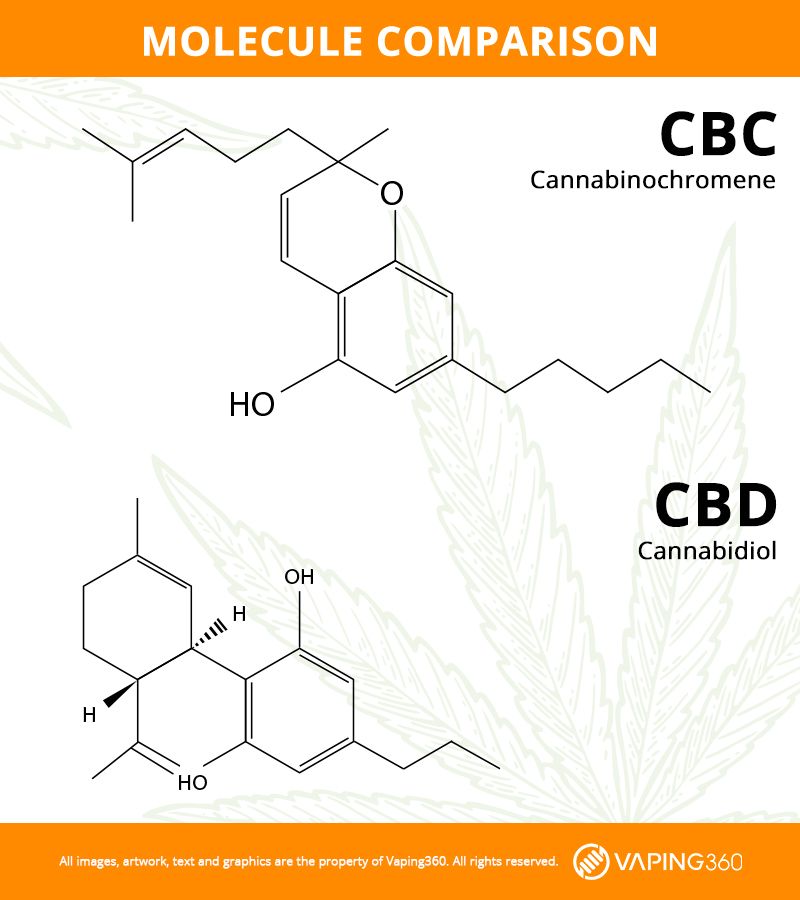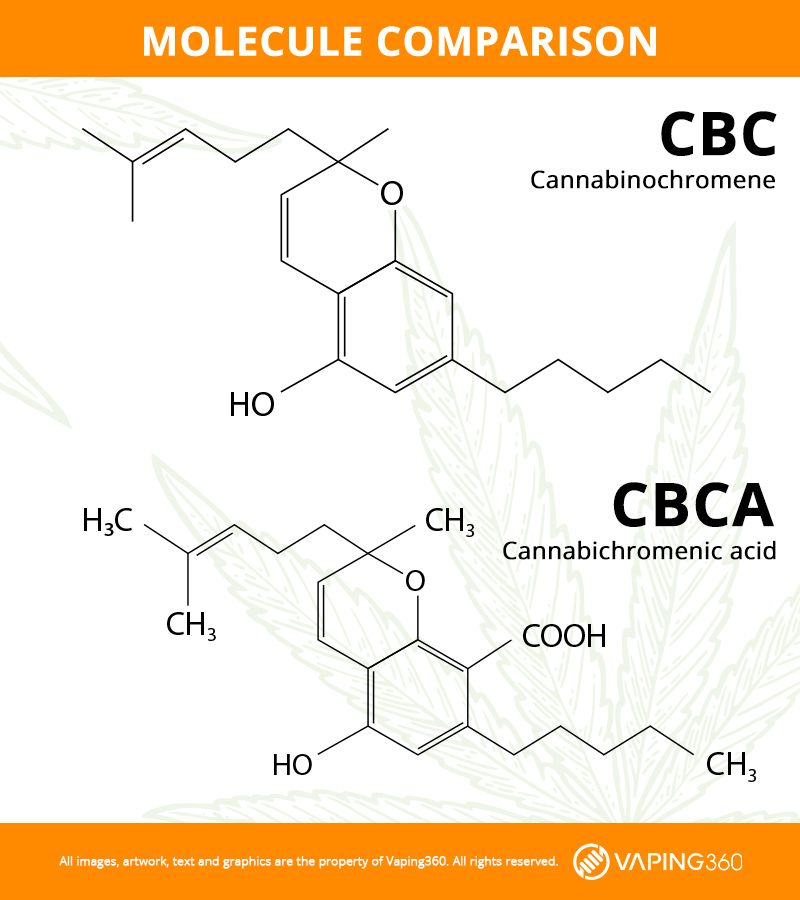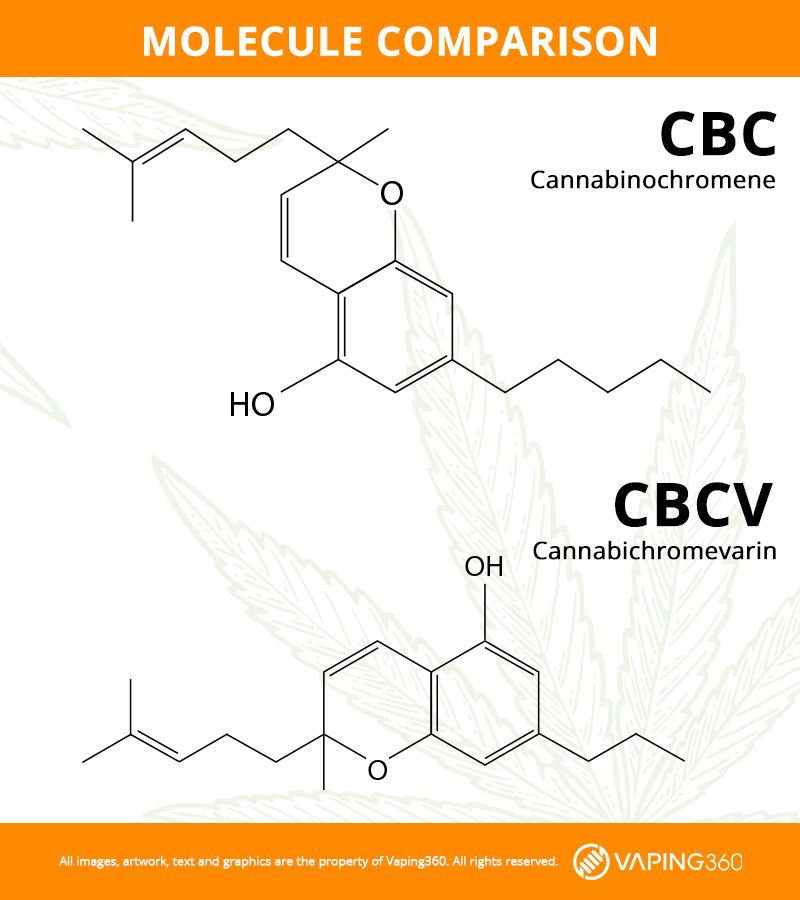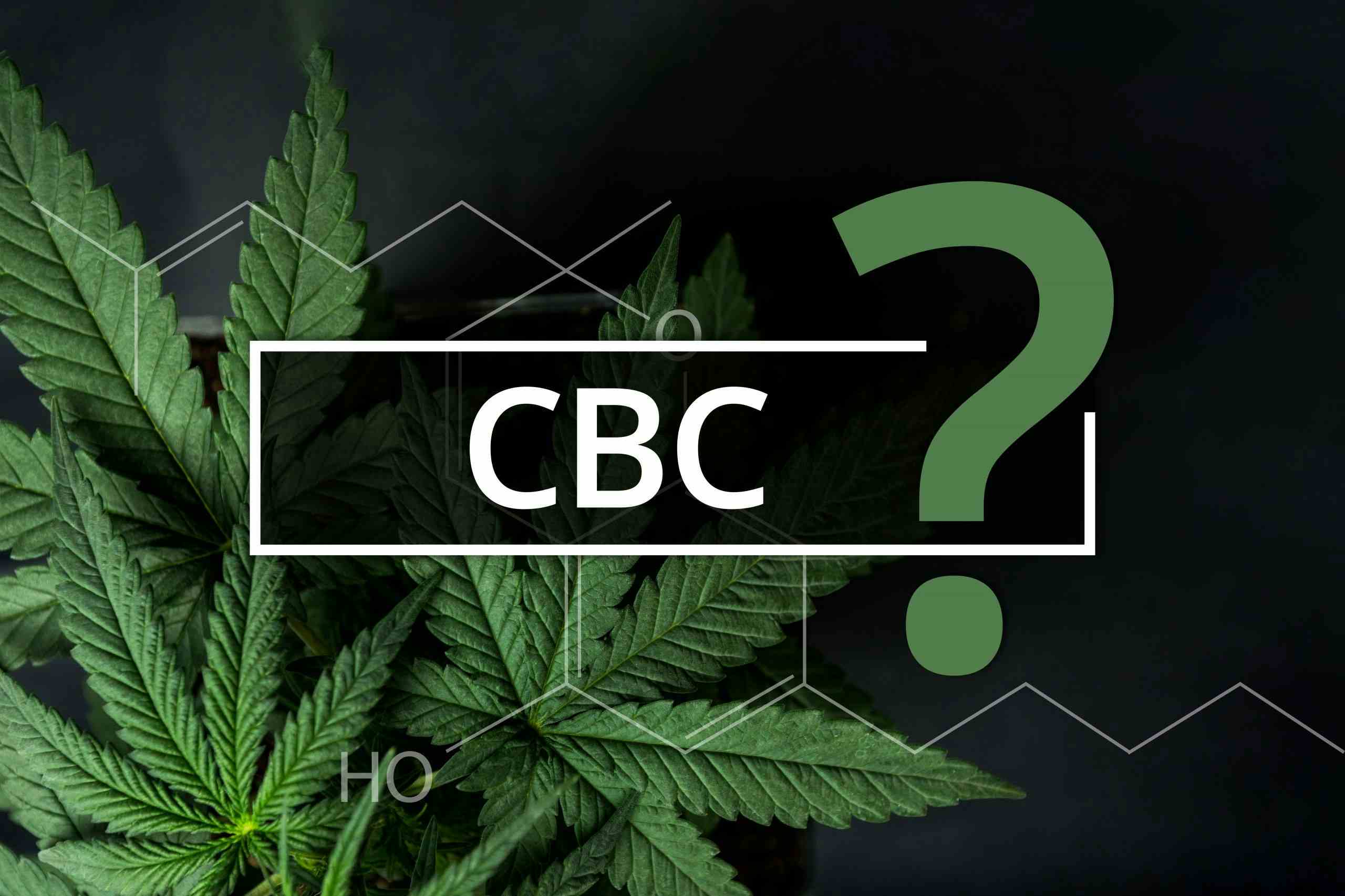As eager as hemp manufacturers are to capitalize on potent THC alternatives, nonintoxicating cannabinoids are getting their own time in the spotlight. Cannabis products are good for more than just your next legal high.
By this stage in our hemp journey, consumers are looking beyond CBD products to ease their minds and relieve everyday aches. CBC, a closely related substance, may possess remarkable benefits. Here’s everything to keep in mind before getting started with CBC, including its side effects, legality, and drug screening risks.
What is CBC?
Chemists have given CBC a few names since its identification, all pointing to the same substance: cannabinochromene, cannabichrome, pentylcannabichromene, and most commonly, cannabichromene. These terms can be used interchangeably, although not all are typical in cannabis circles or literature.
Whatever you choose to call it, CBC is a key phytocannabinoid—a naturally occurring cannabis derivative, not one created from the ground up in a lab. You’ll likely find small to moderate amounts of it in commercial cannabis flower, with its exact density differing between strains and breeding practices.
The CBC compound was first isolated in 1966, just two years after delta 9 THC, the primary active cannabinoid in marijuana.

Does CBC get you high?
No, you won’t get high after consuming CBC products, regardless of form or consumption method.
Intoxicating cannabinoids must bind effectively to the endocannabinoid system’s CB1 receptor. CB1 activation kicks off a rapid influx of dopamine, the hormone responsible for the fuzzy, euphoric feelings best associated with getting high.
CBC has insignificant CB1 receptor affinity. It won’t get you high despite interactions with other nervous system receptors, whether serving as an agonist or not.
What are the effects of CBC?

Neural cell regeneration
If it wasn’t clear after THCP’s discovery in 2019, Italian researchers are making essential contributions to the developing hemp sphere. A separate team from Italy brought one of CBC’s greatest qualities to light just four years later: cell regeneration.
Before new brain cells and neurons can differentiate and mature, they begin their lives as neural stem progenitor cells. CBC might be able to support this cycle, keeping cells healthy throughout the delicate maturation process.
Recent findings lead researchers to believe that CBC may enhance neurogenesis, and, by extension, protect the nervous system. Traumatic brain injury patients could feel the brunt of such an effect.
These developments build upon research from a decade previous. Now that the ball is truly rolling, new studies are practically bound to pop up in the future.
Anti-inflammation and pain reduction
As with its nonintoxicating siblings (CBD, CBG, etc.), CBC may be an effective way to reduce or prevent inflammation. Its anti-inflammatory effects could reach peak potency when administered alongside delta 9 THC. This merging of benefits is known as an additive relationship.
On a practical level, the types of inflammation each cannabinoid targets vary. Research aims to identify these real-world uses. There’s a good deal of overlap, but no cannabinoid is a one-size-fits-all treatment for every inflammatory condition, no matter the issue’s location or severity.
One of the most commonly explored targets is the gastrointestinal tract. A handful of cannabinoids show promise as inflammatory bowel disease (IBD) treatments or adjacent therapies. CBC falls squarely into this category, appearing to reduce hypermotility (excessive movement) in the digestive tract. It achieves this independently of the body’s endocannabinoid receptors.
CBC’s effects on the digestive system don’t appear to rely directly on TRPA1, either, but that doesn’t mean this receptor isn’t important to the cannabinoid. TRPA1 is just one example of a transient receptor potential (TRP) channel, which are frequent targets—directly or indirectly—of nonintoxicating, therapeutic cannabinoids. These receptors help modulate a variety of bodily functions, including pain, vision, and temperature.
It currently seems that CBC is the most potent TRPA1 agonist in cannabis. Research into its anti-inflammatory and analgesic properties could uncover great medicinal potential. By now, chemists suspect that CBC’s pain-relieving effects are at least comparable to CBD.
Thanks to these TRP receptor interactions, CBC might also help treat acute respiratory distress syndrome (ARDS), a complication of sepsis.

Other medicinal uses
Even beyond the examples described above, CBC looks promising in areas of medicine such as:
What are the side effects of CBC?

The side effects associated with CBC don’t differ much from CBD. Some individuals are more prone to negative outcomes, of course, and it’s worth keeping an eye out for:
Remember that any cannabinoid can have undesirable effects, whether or not it gets you high. First-time users should start with a small dose and work their way up. If you experience any of the issues listed above, you may opt to cease use, take a break, or reduce your dose.
Is CBC safe?
We don’t have any reason to believe that CBC itself is unsafe, but consumers should approach every hemp product with skepticism. The United States hemp industry is unregulated. Until there are clear third-party testing requirements, manufacturers aren’t obligated to provide a certificate of analysis (COA).
Trusted brands with transparent safety testing will release COAs to the public. These documents are used to prove that each batch of CBC extract is free of contaminants and that all claims about its contents are accurate. Unless you can locate and review the COA, don’t buy the hemp product. It’s that simple.
CBC vs. CBD

Despite the obvious variations in their effects, CBC is an isomer of both THC and CBD.
The trio share a weight (314.47 g/mol) and chemical formula (C21H30O2). All of the same molecular building blocks are there, just arranged differently in space. Even one or two repositioned bonds can trigger unique effects and interactions with the body’s endocannabinoid receptors.
CBD and CBC are overall similar. While they have their fair share of common benefits, the intensity of each varies depending on which cannabinoid we’re examining. Both substances have been shown to reduce inflammation, inhibit the growth of cancer cells, and fight pain. Neither is going to get you high.
What it comes down to is this: CBD has undergone leagues more research than CBC. It’s also far simpler for consumers to get their hands on.
A CBD-based drug, Epidiolex, has been approved by the United States Food and Drug Administration (FDA) as an epilepsy treatment. No such pharmaceuticals exist for CBC or any other cannabinoid.
CBC vs. CBCA

Cannabichromenic acid (CBCA) is the acidic precursor of CBC. If you’re already familiar with the THCA to THC pipeline, this biosynthetic chain works much the same: CBCA is an unstable acidic cannabinoid, and with age or environmental influences, its carboxyl group is removed. Removal of this group converts the substance into its more stable, active form (CBC).
Still, even CBCA isn’t produced directly by the cannabis plant. CBGA, the so-called mother cannabinoid, needs to arise first. No cannabinoid proceeds in this chain. CBGA is instead an olivetolic acid byproduct that can convert into several other compounds, depending on the enzymes it comes into contact with. Alternatively, if CBGA is decarboxylated without exposure to an enzyme, it becomes CBG.
CBCA forms when CBGA is converted by the CBC synthase enzyme. From there, heat, UV exposure, or age can create CBC.
Like CBC, CBCA may have antibacterial properties and could even be useful in treating methicillin-resistant Staphylococcus aureus (MRSA). Research into CBCA is more limited than with CBC itself.
CBC vs. CBCV

Cannabichromevarin (CBCV) is what’s known as a varin cannabinoid, possessing structural similarities to THCV. Their effects are otherwise distinct.
Unlike CBCA, CBCV isn’t a descendant of CBGA. Its origins actually lie in divarinolic acid-derived CBGVA, which converts into CBCVA post-exposure to the CBCA synthase enzyme. Different sources, different precursors, and different enzymes needed to prompt conversion. These chains don’t naturally intersect. CBCV can’t become CBC, and vice versa.
First isolated in the mid-1970s, CBCV has been on researchers’ radar for around a decade shorter than CBC. Neither are intoxicating. THCV, by contrast, may get users high at a large enough dose—it’s just far less potent than delta 9 THC.
Little is known about CBCV’s effects when consumed, though it may possess anticonvulsant, anti-inflammatory, and analgesic characteristics. Research is limited, but not nonexistent.
Does CBC show up on a drug test?
No, pure CBC isolate won’t cause you to fail a drug test. These screenings are seeking the THC-COOH metabolite, produced by the liver after filtering out THC or another intoxicating cannabinoid. Nonintoxicating derivatives like CBC and CBD become separate metabolites.
Hemp products are still a tricky topic when we’re considering drug tests. For one, there’s no guarantee that what you’re using is free of trace cannabinoids. Full- or broad-spectrum products put you at the highest risk of mishaps, as these are specifically formulated to include a medley of cannabinoids and terpenes.
Small amounts of any cannabinoid can accumulate in your system. If you’ve been enjoying broad-spectrum CBC oil for the past year and have a drug screening tomorrow, it’s not a guarantee that you’ll pass—you probably will, but the risk of failure is there. It’s in your best interest to cease hemp use if you have an upcoming test. Better safe than sorry.

Is CBC legal and where is it sold?
Yes, CBC is currently a legal hemp derivative under the 2018 Farm Bill. It’s unclear how aggressively U.S. lawmakers will target nonintoxicating cannabinoids in the updated document, but there’s no harm in staying informed. The legal hemp industry is young and laws are still being tweaked and developed.
CBC products of any kind are required to contain under 0.3% delta 9 THC by dry weight. You can find tincture oils, edibles, and vapes from a growing number of online hemp sellers. Remember to check for a recent COA before placing any orders.

Hayley Heidelbaugh
Vaping for: 4 years
Favorite products:
Favorite flavors: White Wedding, Northern Lights, Platinum Valley, OG Kush
Expertise in: Oil carts, cannabis concentrates, cannabis flower


